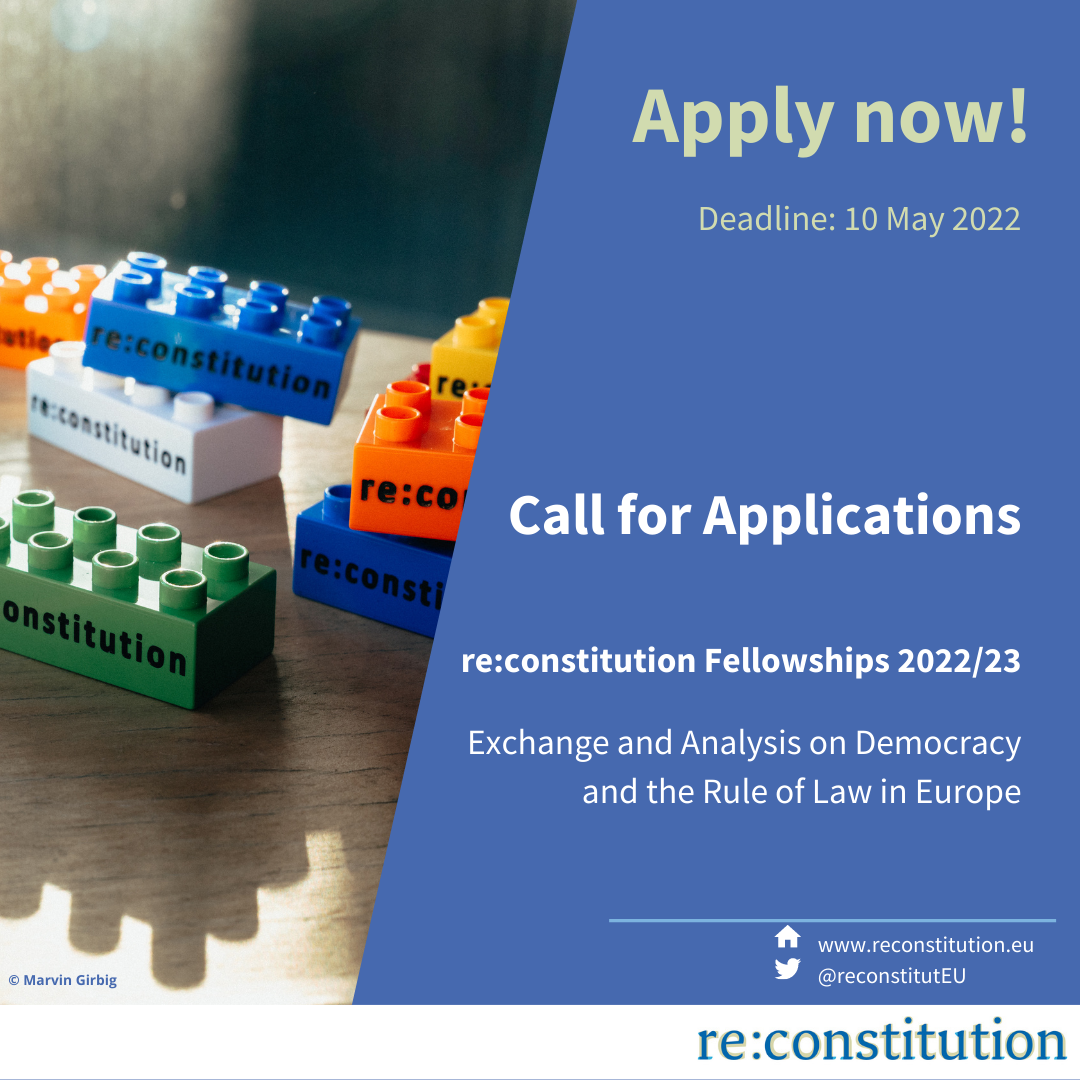The re:constitution programme
The rule of law is a prerequisite for the protection of democracy, fundamental rights and other common values in the European Union. It is essential for the functioning of the European Union, but has been recurrently breached in some member states for years. Therefore, the active protection, ways and means of upholding the rule of law have become much-discussed political, legal and social issues. The re:constitution Fellows pursue their own topical projects to address these developments and challenges to democracy and the rule of law in Europe, adding their voices to this European discourse. They become part of a European exchange network of scholars and practitioners, building bridges between diverse personal backgrounds, disciplines and countries.
re:constitution is a joint programme of Berlin-based Forum Transregionale Studien and Democracy Reporting International, funded by Stiftung Mercator.
Eligibility
You are in the early stages of your career as
- a scholar holding a PhD in law/legal studies and/or political sciences, social sciences, philosophy or other neighbouring disciplines (focusing on legal issues and/or the rule of law in Europe). Your PhD project should have been completed no more than 10 years ago. Scholars who are still working on their dissertation may be eligible if their PhD is close to completion.
- a practitioner, e.g. a government official (policy advisors etc.), a judge or practising lawyer, an NGO legal/policy expert working on rule of law and democracy in the EU, a journalist reporting on the rule of law and/or democracy in the EU, general researcher/legal expert working on questions pertaining to the rule of law and/or democracy in the EU (this list is non-exhaustive). For practitioners, comparable work experience is expected, but a PhD is not required.
Residents of the European Union, non-EU EEA countries, Switzerland and the United Kingdom are eligible to apply.
You are seeking
- more insight and exchange about specific questions of democracy and the rule of law in Europe,
- new ways to work on your own topical project in a high-quality and flexible environment of debate and learning among scholars, legal practitioners and journalists from across Europe,
- to become part of a diverse group of Fellows to debate and learn from each other,
- to engage with a unique European network of experts,
- to pursue new personal and remote work opportunities at institutions in other EU countries,
- more approaches to engage in multi-faceted exchange about questions on democracy and the rule of law with experts from all over Europe, from different sectors and with different political backgrounds.
Benefits
- Stipend: Fellows receive €2,500 per month for a 6-month mobility period during the 2022/2023 academic year.
- Independence: We provide re:constitution Fellowships for one academic year, starting from 1 October 2022 to 31 July 2023, offering the freedom to pursue your own project on a topic of your choice.
- Exchange & Debate: There will be three Fellows’ Exchange Meetings over 2-3 days each in different EU countries or online, depending on travel restrictions. Additionally, there are opportunities to attend and organise events with emphasis on specific aspects and topics of the programme.
- Mobility: The key element of the Fellowship is the mobility period of six months, which can be taken flexibly between October 2022 and July 2023. During their mobility phases, Fellows collaborate with two host institutions of their choice in academia and in practice in EU countries. The host institutions must be in a different location to your current EU country of residence. The mobility phase must be divided between a research institution and an institution working in a practical context.
- Network: Fellows are given access to a European network of scholars and practitioners who are interested in and working on questions on the current state of democracy and the rule of law in Europe.
Commitment
Fellows work towards project outcomes during their Fellowship. These will be published as re:constitution Working Papers. Alternatively, other outputs are possible (e.g. policy papers, reports, podcasts, blog entries).
Fellows ensure their participation in regular Fellow Talks and the three Fellows’ Exchange Meetings.
We are monitoring the COVID-19 pandemic closely. In the interest of the health and safety of our Fellows and to comply with government regulations, we have introduced more flexibility into the programme by offering a combination of digital, hybrid and in-person exchange formats.
How to apply
Please submit your application via our secure online application platform by 10 May 2022, 12 noon CEST: https://application.trafo-berlin.de/
Applications by e-mail will not be considered!
As part of your application, you will be asked to prepare and upload the following:
- Curriculum vitae including publications (2-3 pages),
- Project outline (2-3 pages),
- Short abstract of your project (max. 300 words),
- Two references (university faculty members or practitioners in a field relevant to the applicant’s project) who can serve as referees (no letters of recommendation required),
- Potential host institutions (your preferred research and practice institutions in EU countries to spend part of your mobility period, ideally including an indication of preferred dates and/or existing personal contacts).
The working language of re:constitution is English.
The diversity of our society should also be reflected in the Fellowships. We therefore welcome applicants of all cultural and social backgrounds, ages, religions, world views, disabilities or sexual identities.
The applications will be evaluated by an evaluation committee of scholars and practitioners working in the fields of democracy and the rule of law. All applicants will be informed of the outcome of the evaluation process by early July.
If you have any questions, please contact the programme coordination team: reconstitution(at)trafo-berlin.de




